Mentorship, hard work, and self-confidence helped East New York-native Ericka Pittman build a powerful career in marketing and advertising.
Each step in her professional journey molded her for her current position as the Vice President of Combs Enterprises Chairman’s Office. The company spearheads major brands like REVOLT, Blue Flame Agency and Aqua Hydrate.
Pittman previously held positions at top companies including Time Inc., Conde Nast, Vibe Media Group. She brings her 22 years of business experience to the table on a daily basis as she leads from her executive level position. As a woman in a male-dominated industry, she believes that women must learn to balance feminine and masculine energies in order to maneuver within the corporate world and come out on top.
Her Agenda spoke with Ericka about major lessons she learned throughout her career, the importance of mentoring and also the how her strongest personality trait has led to her success.
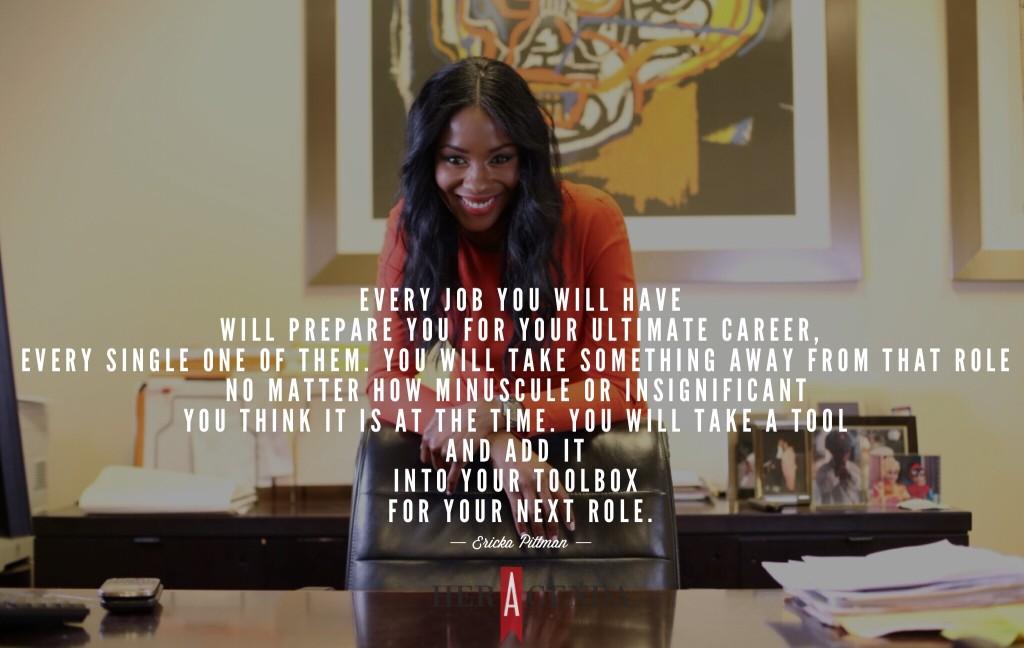
Her Agenda: Can you share moments from your past or your time in college that you believe prepared you for your current position?
Ericka Pittman: I went to school full time and I worked full time in college. It was a really unique experience for me, I was able to apply the theoretical tools that we were learning in undergrad to professional life experience. It helped me to get really acclimated to the industry that I wanted to ultimately build a career in but also it helped me to multi-task because college and the real world [are] two different places. Being able to operate politically and navigate the deliverables of undergrad with professors and deans and school performance requirements is a very different set of requirements than in real life and making sure you’re living up to the deliverables of your job description at work. Early on in my career I was able to figure out a way to successfully juggle both.
Her Agenda: What is most empowering about being a woman in a C-Suite position at Combs Enterprises?
Ericka Pittman: The most empowering thing for me in the position that I have is that my chairmen trust my professional opinion and my advice as it relates to impacting the business. It’s empowering to know that the work that I’m doing is falling on listening ears, versus deaf ears, and it’s really impacting the overall business model at large. So it feels good that you know I’m investing a lot of time and energy in my role here but at the sametime that time and energy is producing results for the greater good of an amazing company.
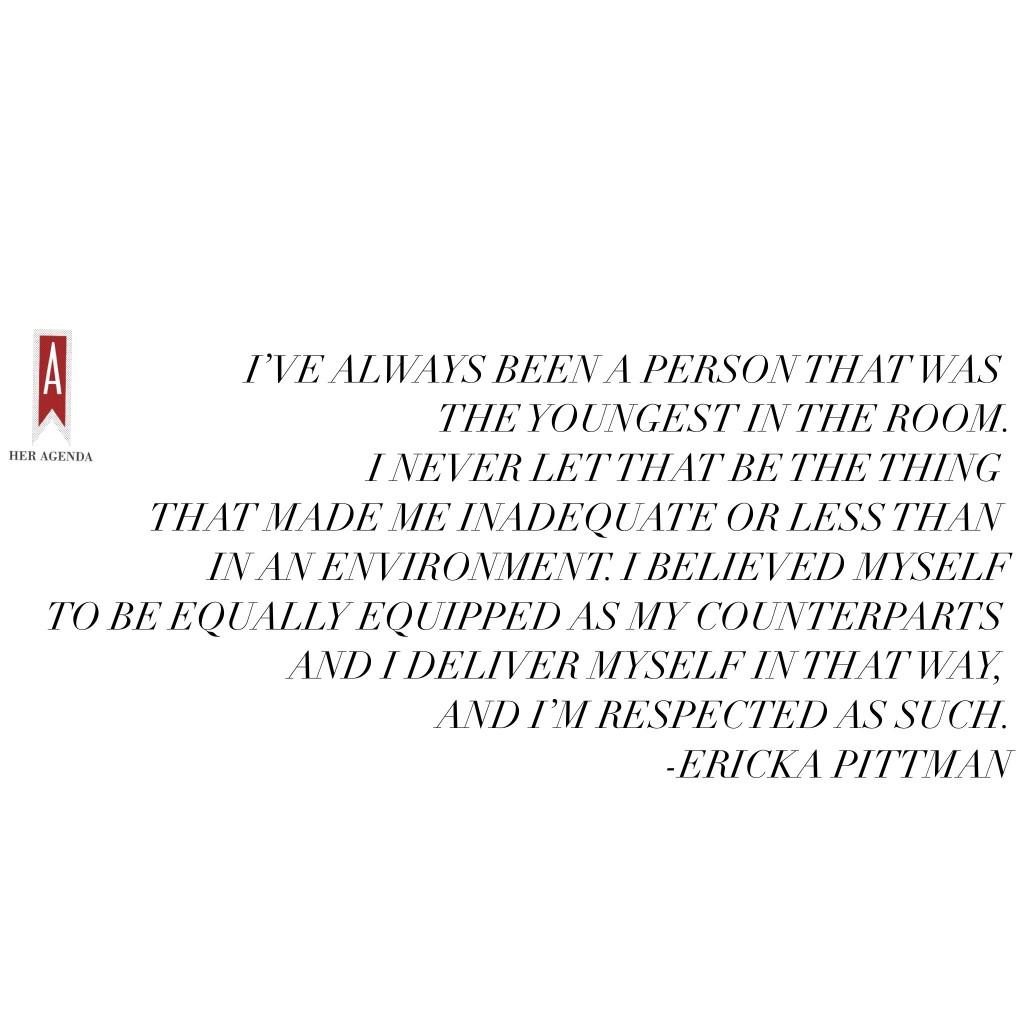
Her Agenda: Throughout your career what is the biggest lesson you’ve learned about yourself that has helped you succeed?
Ericka Pittman: I believe the biggest lesson that I’ve learned for myself is: perception is reality, and I don’t mean that externally, I mean it internally. Truly what you believe yourself to be and how you position yourself in an environment is really what everyone else will receive. I’ve always been a person that was the youngest in the room I graduated from high school very early, I was almost 17. I was really young in college, I was young starting out my career and throughout my career I’ve been fairly young when I look at my counterparts. I never let that be the thing that made me inadequate or less than in an environment. I believed myself to be equally equipped as my counterparts and I deliver myself in that way, and I’m respected as such. So, you know how we perceive ourselves internally is directly correlated to how people receive us.
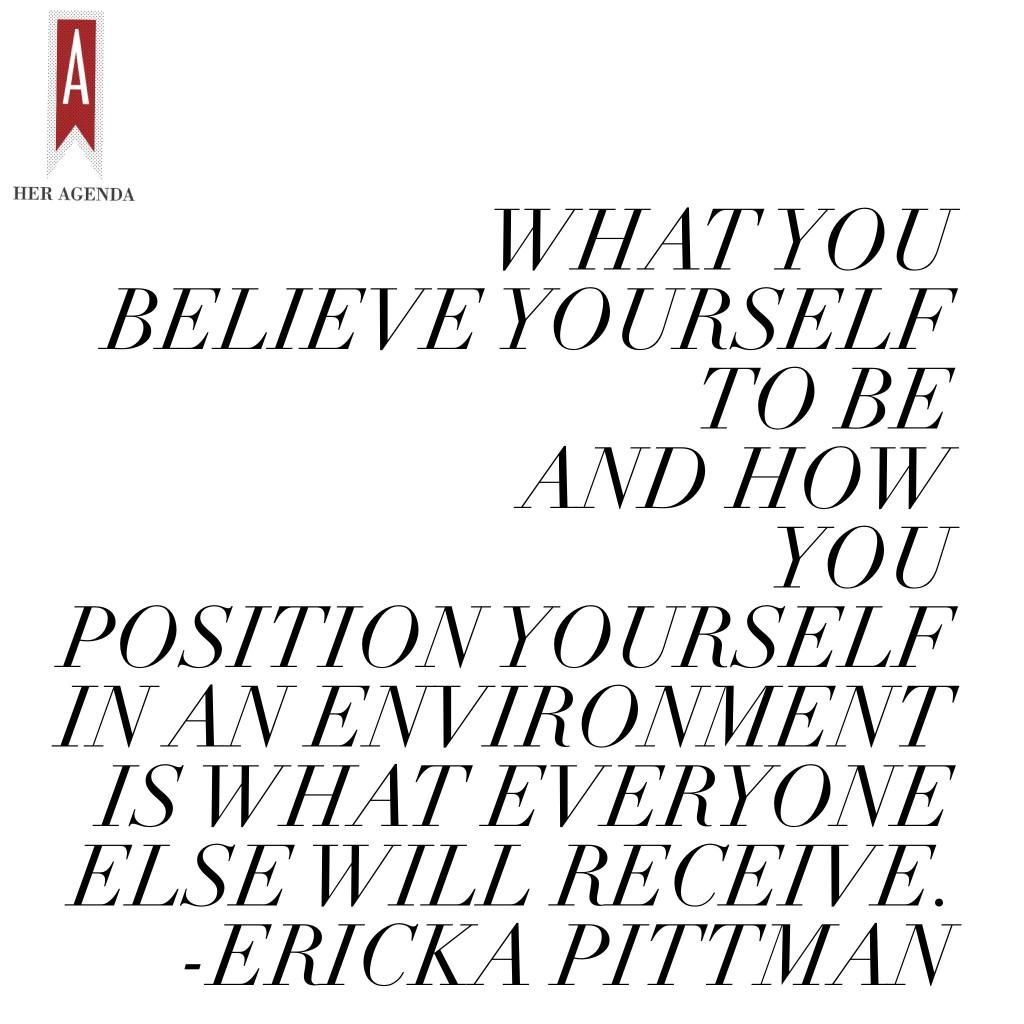
Her Agenda: Do you believe it’s important for young women to be mentored? How important was mentoring along your professional journey?
Ericka Pittman: I believe that all people should mentor, not just women, not just women to young women, but all people should mentor and seek out mentors. It is very important to align yourself with the people that you identify with in terms of your long-term growth. If you have a vision for who you want to be in your life, it is important for you to align some archetypes in that industry that have achieved the things that you would like to achieve so that you can gain insight and understanding of what the road ahead is going to look like.
It is information and knowledge that mitigates disaster. You want to know as much as you can about what not to do or perhaps what you should do faster so that you can have a leg up on your competition and get to your goal faster. I don’t think that any of us should ever stop seeking out mentorship, there’s always something to learn. In that same right, it’s also important to make sure that you’re continuously giving back and helping others grow that are coming behind you. It’s just good karma honestly. I believe that while I may have my hand reaching up, to ask a mentor to help me pull up to my next level, I need to have a hand behind me to make sure that I’m pulling someone else up with me. And it’s really important to always sort come from that space in order to ensure that everyone is reaping the benefit of your greatness essentially.
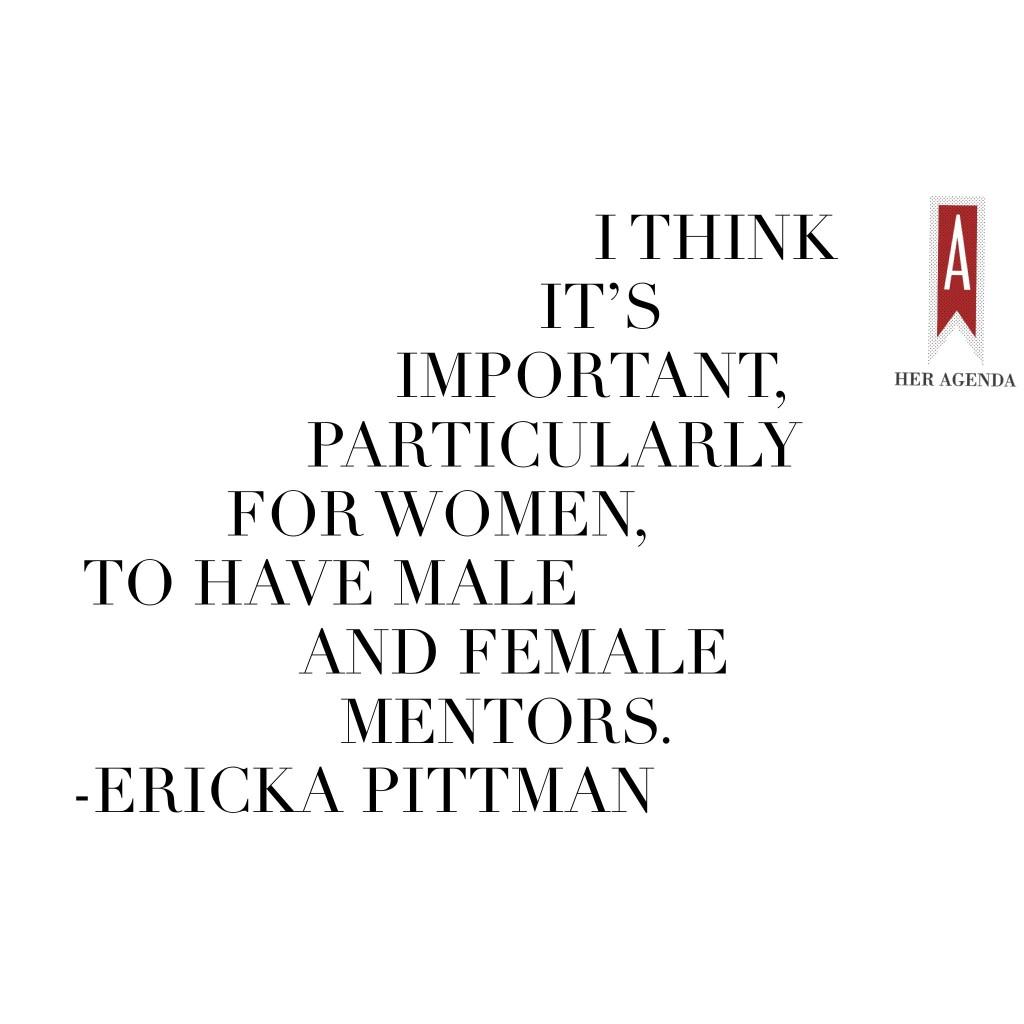
Her Agenda: Were there any specific mentors that have contributed to your professional journey?
Ericka Pittman: Absolutely I have tons of mentors. I have one mentor that I adore her name is Lita Cunningham she’s pretty fantastic, just a great woman and a dear friend. Over the years, she’s become a dear friend, but originally started out as a mentor. But prior to her I’ve had tons of mentors, Steve Stoute at one point was a great mentor. Keith Clinkscales was a great mentor when I was much younger. And then Len Burnett who owns UPTOWN magazine was a great, great mentor to me and even Sean Combs was a mentor. My mother is a great mentor as well. I think it’s important, particularly for women, to have male and female mentors. At one point in my career, all of my mentors were men. So what I’ve learned is a very aggressive, forward business style because I’ve learned from successful men. What I realized is I was not harnessing the power of being female and femininity. It was not until I started working with a female mentor that I began to understand. Suzanne de Passe is also an amazing mentor for me. Just recently I started to zero in on more female mentorship because I realize the power in femininity and trying to understand how to harness that and really leverage the power in an executive seat.
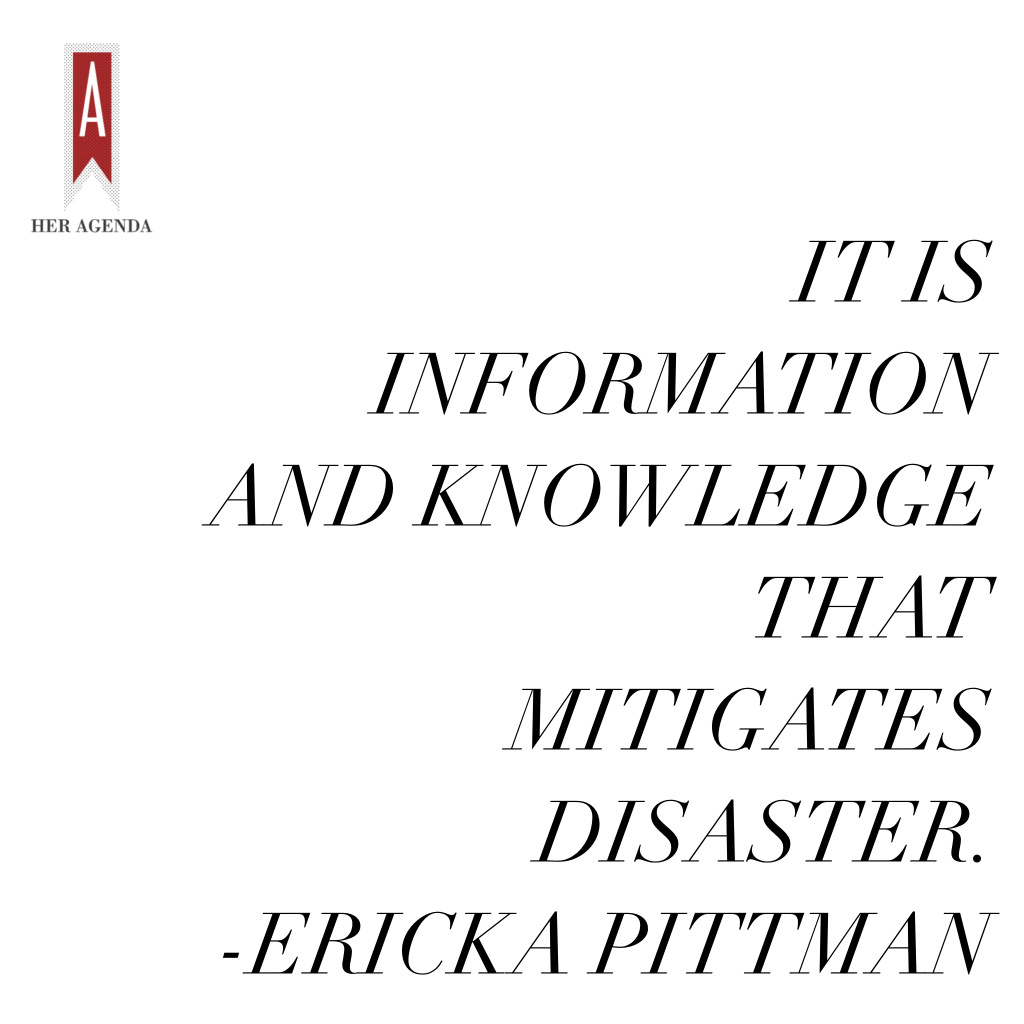
Her Agenda: What was the most pivotal moment you’ve experienced in your career?
Ericka Pittman: I was in sales for about 15 years and I decided I just did not want to do that anymore. It wasn’t in my wheelhouse anymore, I was a bit burned out and I’d always wanted to be a senior level marketer. I couldn’t really figure out the track to transition into that role. Making the leap to creating exploratory conversations in the marketing community and land on the job that I was able to acquire at Blue Flame [Agency] really was a pivotal point in my career and has taken my career exponentially to a different place. So, making the decision to move into marketing from advertising and then pursuing it actively and taking the leap of faith and accepting the job at Blue Flame [Agency] as the Vice President of Brand Strategies was one of the best decisions that I’ve ever made in my life. Actually, March 1st was my seven year anniversary with Combs Enterprises, this is the longest job I’ve ever had. I’ve received five promotions in seven years. And so it’s just been a really wonderful experience. Super hard, probably the hardest job I’ve ever had but wonderful and gratifying at the same time.
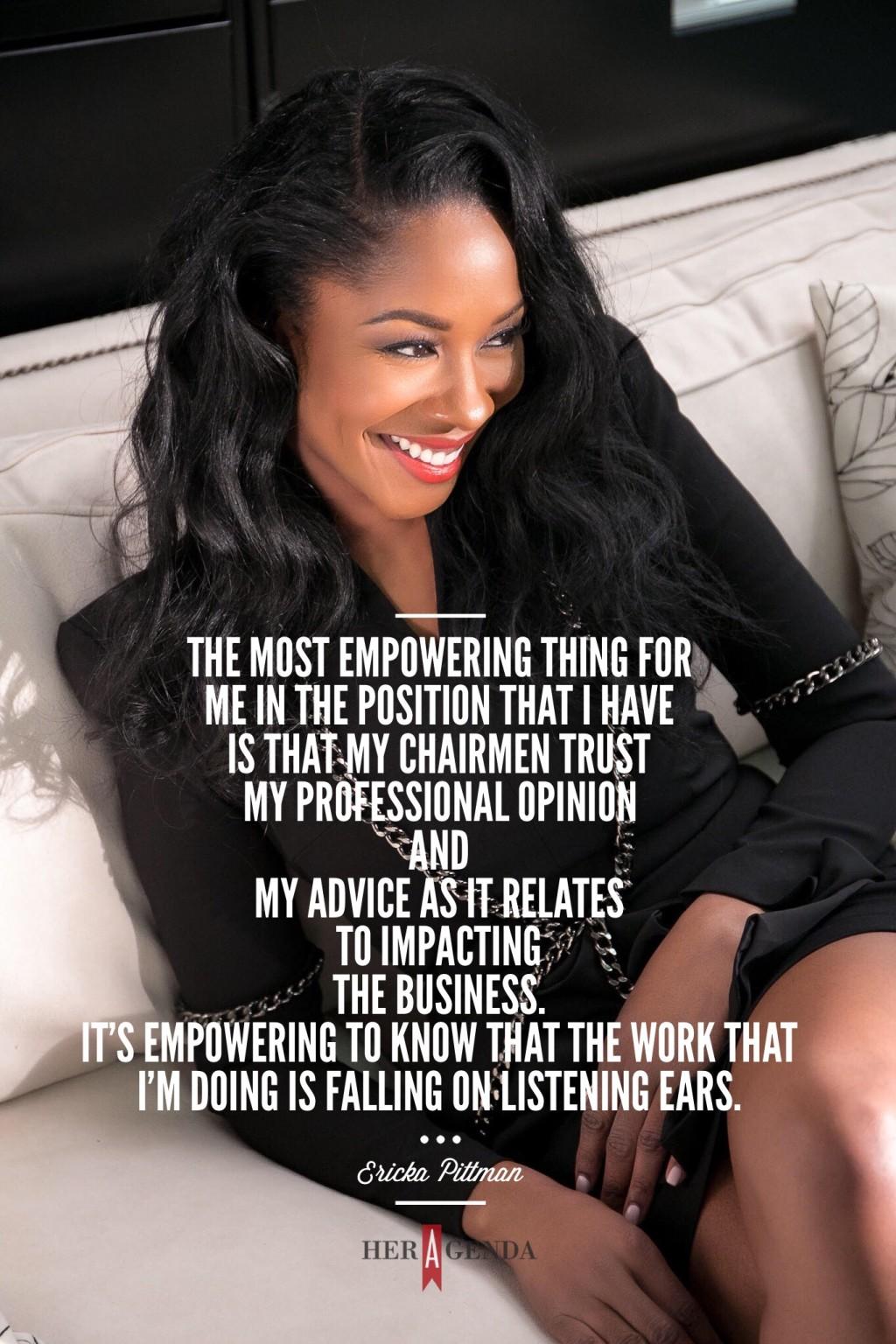
Her Agenda: What is the strongest personality trait that you embody that has allowed you to be a great leader?
Ericka Pittman: Confidence. I’m absolutely confident, I believe in myself. I believe in what I know. I believe in what I don’t know. I’m unapologetic about what I don’t know. I’m very forthcoming and I surround myself with really smart and powerful people so that they can compensate for the things I don’t know. I can actively and outwardly admit that there are things that I don’t know and praise those around me that do know them, and I think that’s helped me to build a substantive leadership style. I empower people to make great decisions. I praise them when they do well. I discipline them when they don’t do well because everything’s a learning experience. But I always say: nothing is cancer except cancer. So when you put things in perspective, human error is an opportunity to learn something in course correct. I encourage people to make decisions and build out their strengths so that they can get better and grow and be better people and professionals.
Her Agenda: What is your personal motto?
Ericka Pittman: Always do well by doing good. I really believe that the world is abundant and there’s enough space for everyone to play a major part in this grand story called life. I feel like if we can be a little bit strategic, think a little harder about situations, there’s an opportunity to have a win-win situation in more cases than not. The way I do business the way I market, the way I manage, the way I lead, the way I live my life is ‘how can I create an opportunity for me to do something great for someone else but also do something good for myself?’
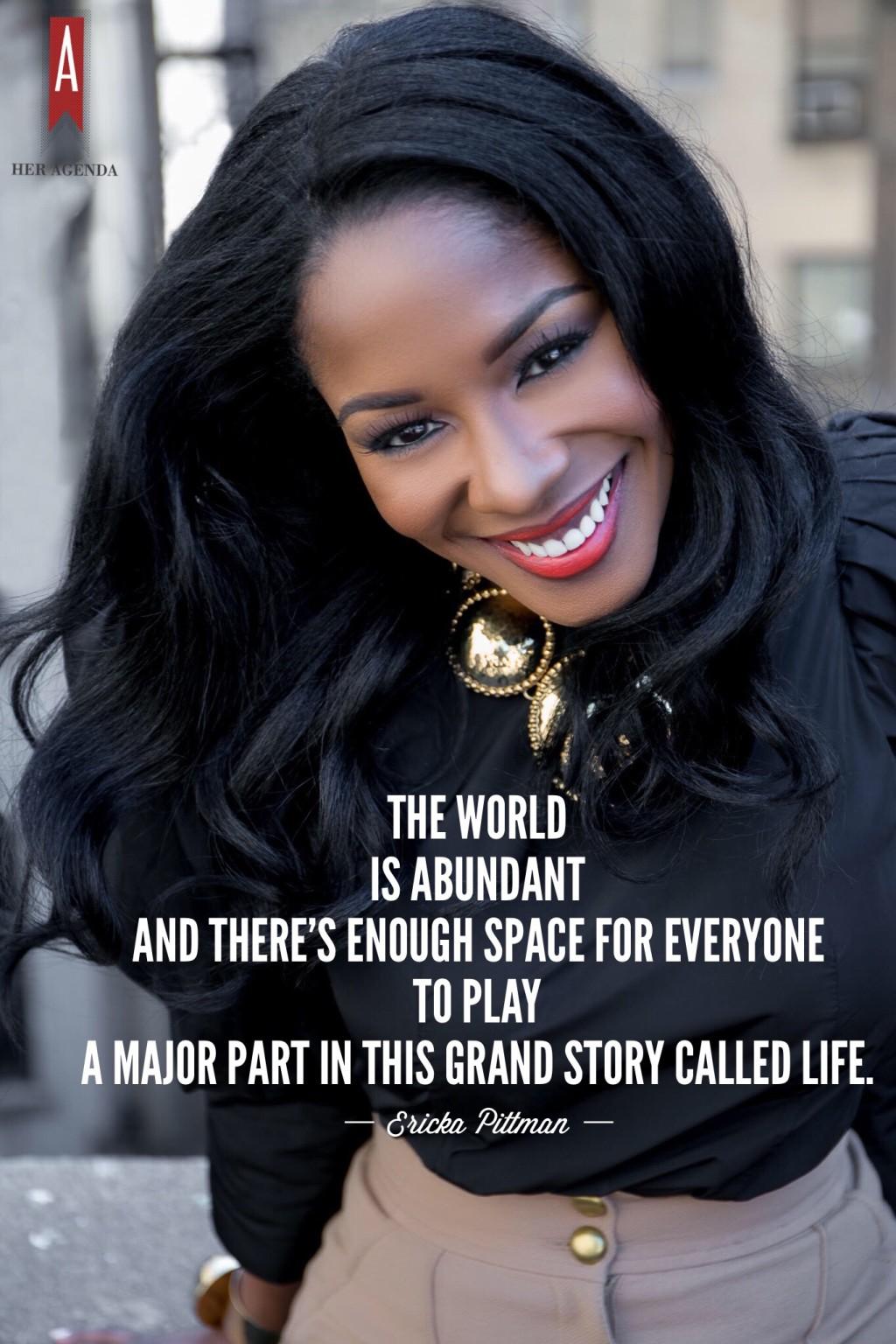
Her Agenda: What difficulties have you experienced within your career? How did you overcome the issues?
Ericka Pittman: Glass ceilings [and stereotyping]. People have these preconceived notions about who I am at the onset based on physicality. I look younger than I am, so often times when I’m in a room I find myself having to qualify my age very early on so that people can take a different approach to their different conversations with me and this is male and female alike. It’s a tremendous struggle so there’s a situation that presents itself in being an African-American, being a woman and appearing as a young woman, which could equate to being inexperienced.
It sets a standard at the onset that I have to break down as a barrier very early on in any communication that I have and in business. Most people are shocked even after I tell them how old I am and I tell them I’ve been in the business for 22 years. They don’t understand, they’re like how is that possible? And I have to constantly remind them that there’s a resume here, there’s history here…I just happen to have good genes (laughs). That’s been one of the biggest struggles, is people making sort of snap judgment based on what they see, versus what’s actually happening underneath the hood.
Her Agenda: Did your background in the magazine publishing industry prepare you for your current position? If so, how?
Ericka Pittman: 1000 percent! My sales experience for 15 years was pivotal in who I’ve been in my role for the last seven years here. Every job you will have will prepare you for your ultimate career, every single one of them. You will take something away from that role no matter how minuscule or insignificant you think it is at the time. You will take a tool and add it into your toolbox for your next role.
Her Agenda: How important is personal branding from your perspective in the age of digital media?
Ericka Pittman: Personal branding is pivotal. How you present yourself to the world is so important and I think that young people that are looking to begin their careers need to be very mindful about what they portray in the social media space. Often people don’t realize that they are curating their profile, their personification to the world. If I go to your Instagram page and I scroll down and I look at all of your pictures, a collage if you will, I’m able to make a general assessment about your personality, about your passion points, about your lifestyle, about the things that are important to you. I can sort of build out an idea of who you are as a person. Now some of that may be snap judgment but nine times out of ten, the things that compel you to post on Instagram are the things that you’re most connected to. It’s important that people are mindful of that. It’s important with social media that we use it as a branding tool for the positive and not the negative.
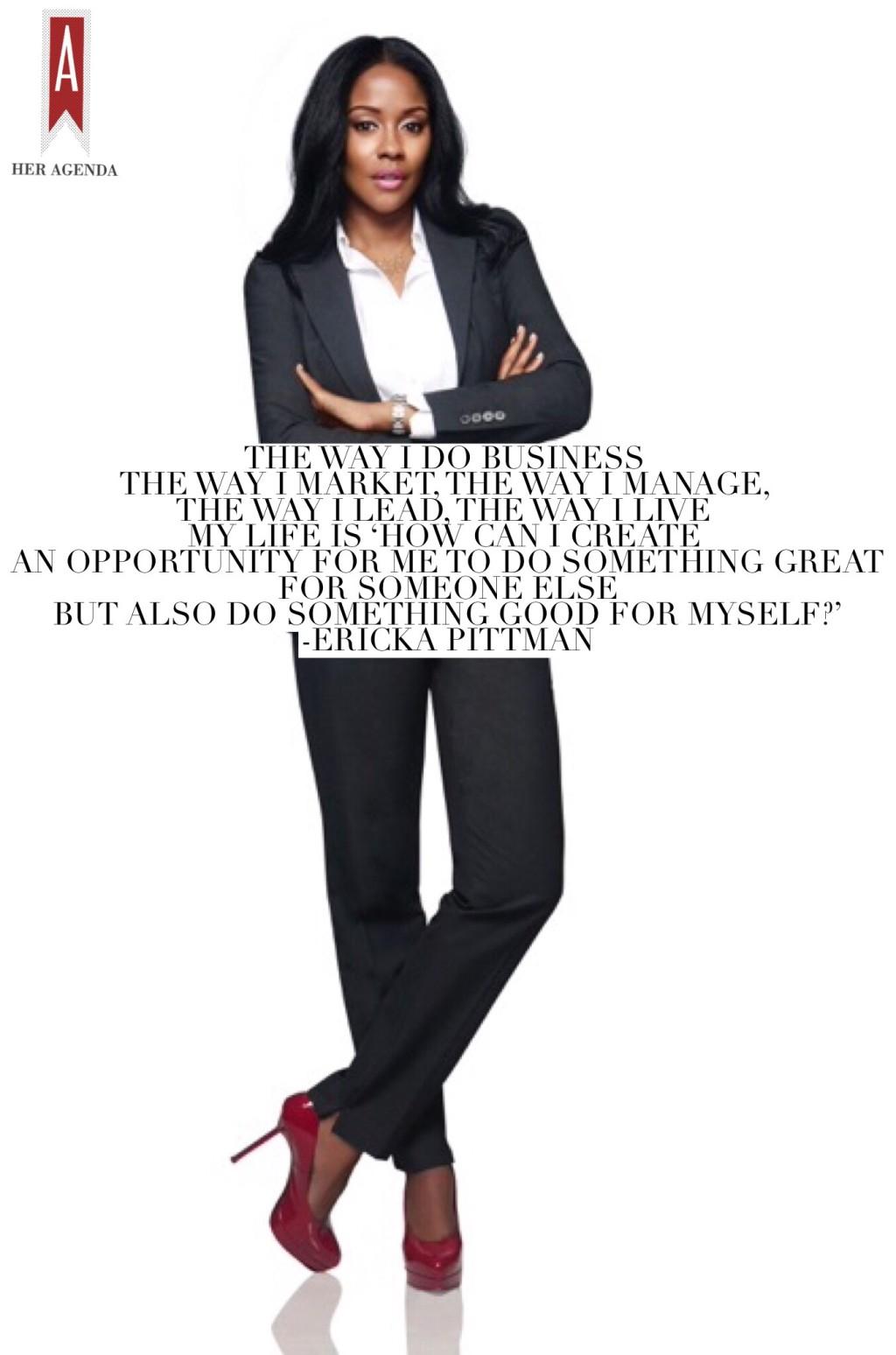
Her Agenda: What words of advice do you have for women interested in pursuing careers in marketing or branding and individuals looking to switch career paths?
Ericka Pittman: I would say formalized education. I know a lot of people are leaning away from formal education but it is really important for you to identify the theoretical concept surrounding marketing and advertising and application in real life. Theory versus practice is the idea. Most people think marketing is throwing sexy parties for Puff Daddy. Most people think that marketing is street teaming and very experiential solutions to communications to a specific audience or consumer. That is not what marketing is. Marketing is understanding the psychographics, really understanding the mind of the consumer you’re trying to target and convincing them that it’s a good idea to purchase your product or service. So if you don’t have the specific knowledge of knowing how to do that, the appropriate way to do that in the marketplace both domestically and globally, you’re ill equipped to grow your career in those categories.
[Editor’s note: This interview has been edited for length and clarity. Publish date: April 25th, 2016.]








